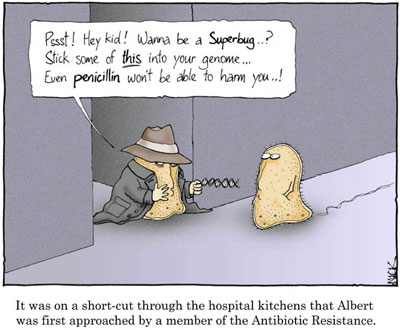
Alice's Red Queen once said, "you see, it takes all the running you can do, to keep in the same place." We are constantly hungering for knowledge, to cure the diseases which may ironically, be caused by our own experimentation. We advance, only to fall backwards again, impeded by our blind search for the meaning of life. We find ourselves looking for antibiotics that cure what mankind as released onto itself. Like Victor Frankenstein who unleashed his monster into the world only to have his loved ones murdered, Marie Curie's radium not only killed herself, but was also used in nuclear weapons that killed others and currently leaves nations at the brink of disaster.
In Raymo's "Measure of Restraint", he relates the tale of the little
girl who, unbeknownst to her, rubbed radioactive materials all over her
body like "carnival glitter". The most dangerous part of knowledge and science is that it assumes the guise of innocence and harmlessness. Our GM (genetically modified) foods sit harmlessly on the supermarket shelves and eventually make their way into the body. What are the long-term effects? They are evident in other arenas of life. We eat antibiotics like we drink water, using them for any aliment. What are we seeing now, decades from the discovery of penicillin by Fleming? We are dumping millions of tons of bacteria into the environment, leading to the survival of drug-resistant strains that leave doctors to "keep running" and find new antibiotics that will, in time, be rendered useless again. Yet we have no other alternative. It's either keep ahead of the pack, or be eaten by the pack. A PBS special remarked that "time was running out" for certain individuals with multi-drug resistance, and that bacteria are gaining resistance too quickly for new cures to hit the markets. Should we let these people die? While Raymo's argument is understandable, it's absolutely irrational not to pursue science altogether. Man was bound to move forward, but he/she must do so with a level of caution.
You hear it on the news everywhere. Plasmids cut and glowing jellyfish genes inserted into bacteria or plants. Corn that is engineered corn, meat that is cloned. What are the consequences in the future. I think it was a bag of Sunchips that I ate once. It was the loudest, crunchiest bag ever, but had a stamp of approval "100% biodegradable" or some other greeny message on it. Although it sounded like an eco-friendly alternative to tossing it in the trash, the bag actually had a disclaimer: It would be reduced to plastic particles barely visible to the eye, yet "____ particles' effects on the environment are unknown at this time". In essence, we're trying to hide our own problems, the trash created from previous experiments, through new experiments. How much longer will it be before we realize that plastic or some unknown particle is killing us, just as the scientists realized that radium was deadly?
Much like how Eve ate the apple from the tree of knowledge and was banished from the Garden of Eden, we must approach science cautiously; it is a double-headed snake waiting to strike when we least expect it.
Annie! I thought your comment on the packaging of Sun Chips was extremely relevant. So many businesses are realizing what an effective sales strategy it is, to put an organic or eco-friendly stamp on their products or even use earthy colors in packaging - I am a sucker for this kind of packaging...I will readily pay a few extra dollars for these products. But rarely do I know (or care to find out) the actual differences between "organic" things and everything else, as well as the true implications of my choice as a consumer. I realized that when we were talking about organic food in class, and I realized that I really don't know what the real qualifications are for organic food (I promptly Googled it when I got home). I think a big thing that Raymo wanted to address was our relative ignorance. Society has grown to a kind of complacence where we just accept what the big people (i.e. corporations, scientists, government, etc.) tell us as fact. But we don't really realize that they are humans too, even if they are more powerful, intelligent, or powerful again (respectively) than us. And because they are human, they don't have all the answers either.
ReplyDeleteHmm I just realized that comment was obscenely long. In conclusion, your post was extremely thought-provoking, and I really enjoy your paradoxical title. :)
ReplyDelete